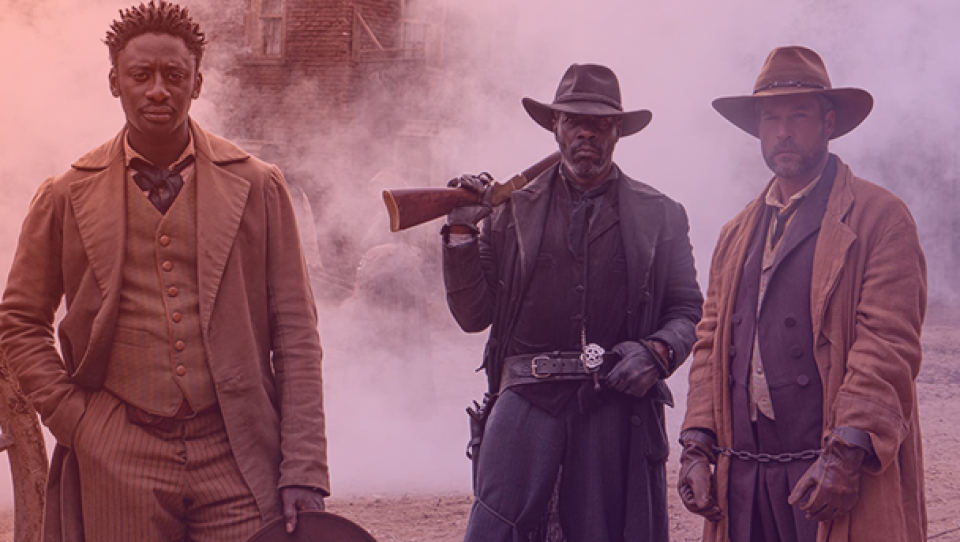Note: This article contains spoilers for Around The World In 80 Days up to Episode 7.
Around The World In 80 Days Episode 7 reintroduces historical racism as a pivotal plot point. Earlier in the season, I examined how the series handled racism and imperialism in the first 5 episodes — you can read that here. As our protagonists reach America, the territory west of San Francisco is filled with natural hazards and people with ill intentions. The episode highlighting the dangers of Confederates and Ku Klux Klan members on the run from the law had the unintentional benefit of airing during Black History Month. Although the amount of input from Black historical experts is still unlcear, Episode 7 forces the characters to confront white supremacy in a way previous episodes did not. Unfortunately, it also leaves out how British imperialism influences their views on Reconstruction Era America.
Once again the novel’s version of events is swapped out with real people and historical trends from 1872. This is not the first time Bass Reeves has appeared in a period drama. Recently, Netflix’s western movie The Harder They Fall combines Reeves’ story with that of several other prominent Black cowboys and outlaws. What sets Around The World In 80 Days apart is that the show is written from the British and European perspectives versus the African American perspective. The outsider perspective introduces bias American historians wouldn’t have.
Miss Sally, the stagecoach driver, is an amalgam figure. Her character contains some elements of the story of Stagecoach Mary, who also appeared in The Harder They Fall. However, Miss Sally also contains splices of character traits from white women such as Annie Oakley and others. Thematically, she is the American Jane Digby; she’s there to model a life that’s unconventional and without the restrictions of marriage preventing a career for Fix.
What about Reeves’ prisoner, Colonel Ambrose Adams? It’s likely he is an amalgamation of several prominent Confederate military leaders. Both famous Ambroses from this era were Union soldiers who moved onto other careers after the war. Adams’ “rescuers” are clearly based on the KKK and other former Confederate groups even if their names are not known.
The term Reconstruction is not used in the episode but this is the designation historians use for the years immediately following the defeat of the Confederate government. The Union Army, US Marshals and federal officials were sent to various Southern states to enforce the newly enacted laws and Constitutional amendments that granted African Americans freedom and citizenship. The white supremacy at the core of the Confederacy was not going to end quietly.
In the episode, Reeves mentions that Adams was wanted by the federal government for “violating civil rights.” One audience member questioned if this legal and political term was used in 1872. I have to admit my initial response was based on a guess that offenses such as lynching and vote denial were known, even if that term was not used. I was quickly corrected by a 19th Century history professor, which prompted additional research. This is a good thing. Period dramas should inspire audiences to find out what really happened. Legislation that passed through Congress a year before the episode takes place andthree years later both used the words “civil rights.” Period drama fans have a worrisome tendency to assume dialogue is modernized if they aren’t aware screenwriters and historical consultants behind the scenes have worked to find era-appropriate language. Around The World In 80 Days has a good track record for this when real events and trends are mentioned, even if the interpretation isn’t always in tune with how viewers of color would interpret them.
While the episode fails to outright name the threat Adams and the posse pose as white supremacy or systemic racism, the episode both shows and tells in regards to how Adams sees Passepartout and Reeves as failing to “know their place.” The way he refers to the “Frenchman” at times sounds dangerously close to racial slurs. His whispers to Fogg about how he should be “protecting Fix’s virtue” show Adams’ revulsion to the natural chemistry Passepartout and Fix have. Adams also repeatedly refers to Passepartout as “boy” another racial dog whistle.
Reeves and other marshals were well aware that former Confederates fled westward not only to evade capture once charged, but also to attempt to set up local governments in frontier towns that replicated the systemic racism of the antebellum South. The second point explains how the posse was able to cut the telegraph cable before surrounding the saloon. The Ku Klux Klan and other white supremacist vigilante groups depended on the support of the average white settler to perpetuate their hatred. The episode does a good job in showing how these vigilante groups operated in the west.
On the other hand, the water rest stop conversation between Fogg and Adams, as well as subsequent dialogue between them, reveals the subconscious biases of British screenwriters. They want the audience to know Fogg is one of the good guys, but Verne’s blindspots regarding racism and empire continue into the script for this episode. Officially, Great Britain was neutral during the Civil War, however many British people were sympathetic towards the Confederacy either out of shared racism and/or due to their dependency on affordable cotton produced by enslaved labor. Adams’ statement about “shared values” alludes to this history, but doesn’t go far enough to interrogate the fact that Britain’s colonies in the Caribbean inspired the Confederacy.
While it is true there was an active abolitionist movement in Britain, this cannot be confused for antiracism. Historian David Olusuga notes in his book Black and British that many 19th century British abolitionists stopped short of advocating for full citizenship rights for emancipated slaves and freedpeople. Some even went as far as claiming Black British people should go back to Africa to live. In addition, many Britons were in favor of colonial exploitation schemes in Africa and Asia, and perpetuating the racial hierarchy that put whites above indigenous residents in these areas. Viewers also noted that Fogg’s comments appear too close to revisionist history on the era. While Fogg’s actions and words signal a condemnation of the Confederacy, they do not come with an equally strong condemnation of racism inherent in British imperialism.
Episode 7 shares the first episode's theme of body horror against Black characters. However, there is a key difference in Episode 7’s cinematography choices and themes. In episode 1, Gerard and the gendarmes were taking shots at each other from 50 feet away. In episode 7, Adams’ posse made face to face threats of bodily harm and take much closer shots. Viewers are well aware that shootouts, threats, and criminals attempting to escape are critical tropes to the Western genre. They may not be emotionally prepared to see Adams’ vandal friends threaten Passepartout with amputation, but earlier scenes in the episode clearly demonstrate the danger of Adams’ ideology. He can present a “nice face” but he speaks in racist dog whistles and is physically repulsed by the natural chemistry between Fix and Passepartout. The vandals are even more outwardly nasty in their language and mannerisms.
Passepartout meeting Bass Reeves marks a landmark moment in MASTERPIECE history. According to my research, this is the first time two characters, whether fictional or historical, representing African Americans and African Europeans talk to each other in a classic novel adaptation. Bringing both halves of the greater Black diaspora together is something that rarely happens in media outside of period dramas, let alone in British classic novel adaptations. This distinction is important because it signals that crime dramas, original stories, and contemporary novel adaptations have more room to create characters that address this issue.The road to MASTERPIECE productions having Black screenwriters from all sides of the diaspora representing themselves begins with the kind of conscious casting featured in Around The World In 80 Days.
Episode 7 is my favorite episode of Around The World In 80 Days because despite the shortcomings in historical perspective, the episode overall does a much better job of portraying Reconstruction Era America than Verne did. Racism is portrayed as a direct threat to the lives of Bass Reeves and other African Americans. The script matched or even topped Episode 5’s open mocking of British colonialism in Hong Kong and greater China. I hope future MASTERPIECE productions consider showing more of the untold or underappreciated stories from American history.





